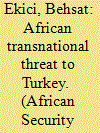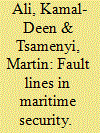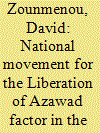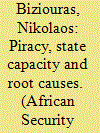|
|
|
Sort Order |
|
|
|
Items / Page
|
|
|
|
|
|
|
| Srl | Item |
| 1 |
ID:
123456


|
|
|
|
|
| Publication |
2013.
|
| Summary/Abstract |
Africa has emerged as a strategic location for transcontinental narcotics trade. Particularly the West African subcontinent has turned into a cocaine warehousing and trans-shipment hub along the way to the European underground markets. At this juncture, African drug networks (ADNs) began to play a momentous role in global drug trade, and pose a considerable threat to international security, as they operate in more than 80 countries. The United Nations Office on Drugs and Crime, Interpol, and Europol perceive ADNs as one of the primary issues in international counter-narcotics policy. These agencies have launched several multilateral initiatives to contain the West African threat. None of these initiatives, however, retarded the expansion of the problem. Indeed, the containment efforts turned out to be quite embryonic. The ADNs eventually entered the Turkish market by the early 2000s. West African drug networks (WADNs) in particular have begun to operate within Turkey extensively, often supplying and distributing drugs. The gravity of the threat became ever more serious by 2012. The upsurge of the new threat has compelled the Turkish drug-law enforcement agencies to adopt new policies and counter-strategies. These policies have to be based upon proper strategic analysis of the threat. This paper seeks to address the need for a threat assessment of ADNs. It investigates the dimensions of the problem, profiles the members of WADNs, their modes of operation, and the factors that compelled them to exploit the illicit Turkish drug markets. The analyses are based upon the scrutiny of 227 narcotic interdictions files and statements from the African individuals in these case files. The paper concludes by presenting policy implications and recommendations for the Turkish security and foreign-policy institutions to cope with this impending threat.
|
|
|
|
|
|
|
|
|
|
|
|
|
|
|
|
| 2 |
ID:
123454


|
|
|
|
|
| Publication |
2013.
|
| Summary/Abstract |
The maritime domain of the Gulf of Guinea presents enormous opportunities for enhancing socio-economic development and human security in the region. However, there are increasing maritime security threats that affect the exploitation of coastal resources, the peaceful use of sea lines of communication as well as the stability of littoral states along the Gulf of Guinea. Dealing with these threats requires maritime security cooperation. This article argues that recent events show deepening boundary uncertainties that have the potential of inhibiting maritime security cooperation and causing regional instability.
|
|
|
|
|
|
|
|
|
|
|
|
|
|
|
|
| 3 |
ID:
123460


|
|
|
|
|
| Publication |
2013.
|
| Summary/Abstract |
The eastern Democratic Republic of Congo (DRC) has been characterised by chaos and insecurity for a number of years, but the rise of the M23 rebellion in 2012 once again highlighted just how dire the humanitarian and security situation is. For most of 2012, the crisis was addressed through negotiations between M23 and Kinshasa, mediated by the International Conference on the Great Lakes Region (ICGLR). However, 2013 marked the signing of the Peace, Security and Cooperation Framework Agreement (PSC Framework), and the United Nations Security Council's adoption of Resolution 2098, which contains the mandate of the long-awaited Intervention Brigade (IB). The PSC Framework calls on Kinshasa to implement substantial political reforms while also urging the neighbours of the DRC to stop interfering in its internal affairs. The IB is mandated to carry out targeted operations against the so-called 'negative forces' that operate in the eastern DRC. For now, hope of resolving this ongoing crisis hinges on the continuing ICGLR negotiations, the implementation of the PSC Framework and the success of the IB. However, there are critical questions about all of these processes that need to be answered and understood, as the expectations for these processes - especially in the case of the IB - are extremely high. Will the ICGLR manage to negotiate a peace agreement and will the IB succeed, or will they go down in history as yet another failure to save the eastern DRC?
|
|
|
|
|
|
|
|
|
|
|
|
|
|
|
|
| 4 |
ID:
123459


|
|
|
|
|
| Publication |
2013.
|
| Summary/Abstract |
Mali has been a battleground for more than a year now. While the armed conflict came in the aftermath of the Libyan crisis that left the regional security environment depleted, it also served as a catalyst for the collapse of state authority in Mali. This created conditions conducive for the proliferation of, and attacks by, radical religious armed groups in the northern regions of the country, including the Tuareg armed movement: the National Movement for the Liberation of Azawad (MNLA). But, far from being a new phenomenon, the Tuareg-led armed insurrection in the northern regions is as old as the post-colonial Malian state, and continues to pose tremendous challenges in West Africa and the Sahel region for both regional and extra-regional actors. The recent crisis in the Sahel region is seen as one of the most serious since the end of the Cold War, with anticipated dire long-term impacts on the security of the region and beyond. While attention is predominantly focused on defeating the jihadist groups that have threatened the survival of the Malian state, one must not lose sight of the fact that the 'Tuareg Factor', as represented by the rebellion launched by MNLA, remains critical both in terms of appreciating the deterioration of the situation and attempting to frame long-lasting solutions. The paper argues that the Tuareg's persistent recourse to rebellion against Bamako needs to be understood within a historical trajectory that takes into consideration three key parameters: firstly, the post-colonial state in Mali and its African leadership's relations with the descendants of the Tuareg communities; secondly, the amalgamation created by the so-called war on terror; and, finally, the contradictions of the democratisation process of the 1990s.1
|
|
|
|
|
|
|
|
|
|
|
|
|
|
|
|
| 5 |
ID:
123458


|
|
|
|
|
| Publication |
2013.
|
| Summary/Abstract |
Africa's wildlife is in danger. The last couple of years have been disastrous for the African elephant as poaching for ivory reached record numbers. Rhinos have been hit hard with several sub-species becoming extinct. The current anti-poaching and anti-trafficking operations lack the sophistication and determination that is found abundantly within criminal organisations immersed in this illicit trade. Terrorism, rebellious elements and corrupt officials all benefit from the destruction of Africa's eco-system and the inaction or lack of efficient action thereof by law enforcement officials. This commentary suggests new courses of action using methods from the fields of counter-terrorism and special operations.
|
|
|
|
|
|
|
|
|
|
|
|
|
|
|
|
| 6 |
ID:
123455


|
|
|
|
|
| Publication |
2013.
|
| Summary/Abstract |
By comparing the Somali experience of piracy with the emerging situation in the Gulf of Guinea, I show that increases in the enforcement aspects of state capacity in the Gulf of Guinea states are necessary but not sufficient tools to combat the emergence, growth, and institutionalisation of piracy. Such tools would require state-building measures that would minimise the incentives of individuals to join piracy organisations and they would have to effectively deal with youth unemployment, income inequality, and environmental degradation.
|
|
|
|
|
|
|
|
|
|
|
|
|
|
|
|
| 7 |
ID:
123457


|
|
|
|
|
| Publication |
2013.
|
| Summary/Abstract |
This article seeks to show that the emotive reconciliation project in Zimbabwe, which is currently spearheaded by the Organ on National Healing, Reconciliation and Integration, is not new in the Zimbabwe polity. Its incarnation under the Government of National Unity clearly indicates the inadequacies and ineffectiveness of the initial reconciliation project, which was enunciated immediately after independence in 1980. In this article we argue that while the notion of resuscitating reconciliation is an important step towards durable peace, this institutionalised, state-centric and state-propelled project is haunted by the very same challenges that undermined and shattered its predecessor. We further assert that the reconciliation and healing project, which is politically engineered and institutionally driven without being inclusive and community driven, is a mere token that comes at the expense of durable peace and the actual victims of violence and impunity.
|
|
|
|
|
|
|
|
|
|
|
|
|
|
|
|
|
|
|
|
|